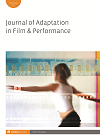-
f Cultural continuity and national emasculation: Werner Herzog’s and Dariush Mehrjui’s cinematic adaptations of Georg Büchner’s Woyzeck
- Source: Journal of Adaptation in Film & Performance, Volume 11, Issue 1, May 2018, p. 27 - 39
-
- 01 May 2018
Abstract
Taking the example of German dramatist Georg Büchner’s play Woyzeck, this article presents several arguments to differentiate an influential discourse on film adaptations: the discourse of fidelity – the idea that adaptations are evaluated by their close translation of an original work of literature to the cinematic screen. After having criticized this discourse in terms of the textual and editorial status of Büchner’s drama, the article provides a comparative case study contrasting two adaptations of Georg Büchner’s Woyzeck to differentiate the issue: Werner Herzog’s approach Woyzeck (1979) and Dariush Mehrjui’s transcultural adaptation Postchi (Postman) (1972). While Herzog’s film is often considered a faithful adaption, it not only provides interesting transformations of Büchner’s drama but, as will be argued, Herzog chose his specific, theatricalized approach to make the film relevant to German audiences of the 1970s by recreating a lost connection to Germany’s cultural heritage. The supposed faithfulness of his adaptation has to be considered in this specific context. Mehrjui’s transcultural adaptation, in contrast, transposes Büchner’s Woyzeck to an Iranian context, making it relevant for specific historical and societal issues in Iran in the 1970s. Büchner’s Woyzeck, in which the theme of the eponymous character’s impotence plays an important role, becomes an allegorical story of national emasculation in Mehrjui’s adaptation. As different as Herzog’s and Mehrjui’s cinematic approaches and intentions may be – creating national cultural continuity versus creating a story of national emasculation – they both develop highly creative adaptations of Büchner’s Woyzeck.


